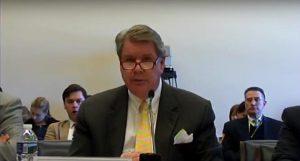
On March 22, 2018, and a month before the 20th anniversary of the Good Friday Agreement, out Worthy President Judge James McKay testified before the Helsinki Commission on Security and Cooperation in Europe. The Commission, at the behest of Co-Chair Chris Smith of New Jersey, was holding a hearing, “The Good Friday Agreement at 20: achievements and unfinished business,” to review the status of the implementation of what panel member Congressman Brendan Boyle described as the “unquestioned gold standard in terms of peace agreements.” However, both Congressman Smith and Boyle both expressed their concern that lack of significant progress in implementing key provisions of the agreement and the new challenge posed by Britain’s desire to pursue Brexit could imperil the agreement and the peace it has established. Judge McKay appeared before the committee with fellow witnesses Brian Gormally, Director of the Committee on the Administration of Justice, and Mark Thompson, Director of Relatives for Justice.
“America must reaffirm through the presence of a Special Envoy that the peace and well-being of the community of the North of Ireland is still a priority to the U.S., and America is willing to walk with the representatives of those communities on the road to a lasting peace.”
In his testimony, Judge McKay noted the accomplishments of the Good Friday Agreement. “During the past 20 years, a generation has grown up in Northern Ireland without knowing the fears and anxieties that constant violence inflicts upon communities.” The Judge also noted, “The economy in Northern Ireland has made significant advances since the Troubles, and despite setbacks from the global recession, the North of Ireland has seen a growth in tourism, growth in foreign direct investment, and a commitment to increasing the private sector.”
“However, the Good Friday Agreement was merely the beginning of a process aimed at creating a fair and equitable society for all the communities of the North of Ireland,” the Judge cautioned. “This is an extremely critical time for Northern Ireland, and as political parties continue to attempt to form a sustainable government while addressing the fears and anxieties of Brexit, we believe that America must reaffirm through the presence of a Special Envoy that the peace and well-being of the community of the North of Ireland is still a priority to the U.S., and America is willing to walk with the representatives of those communities on the road to a lasting peace.” “If something as benign as the promotion of the Irish language cannot be resolved, then what hope is there to address more contentious issues?”
The Judge also noted the failure to honor the Good Friday Commitment to address the legacy of the past, noting “[addressing] ‘legacy issues’ is critical to finding a path forward.” Judge McKay noted that there appears to be an on-going double standard of justice; that if Civil Rights Campaigner Pat Finucane’s murder had occurred in London as opposed to Belfast there would be no hesitancy to conduct a thorough investigation and transparent hearing.
Judge McKay concluded “The U.S. must continue to support and guide the full implementation of the Good Friday agreement, and the administration can show this foremost by appointing a new Special Envoy to Northern Ireland.” The Judge also signaled the Hibernians’ commitment to the McGuinness Principles, stating, “The Ancient Order of Hibernians in America fully supports these espoused principles and believe that they are in keeping with the best values of our organization: Truth, Respect, Equality, and Self-Determination.”
The hearing concluded with Congressmen Smith and Boyle indicating their deep concern for the Good Friday Agreement. Congressman Boyle stated, “This is a very disturbing backsliding the likes of which we have not heard for the previous 19 years.” Congressman Smith stated that he has introduced H.Res.777, which calls for the United States, the British and all parties, including the Republic of Ireland, to recommit to the peace process.